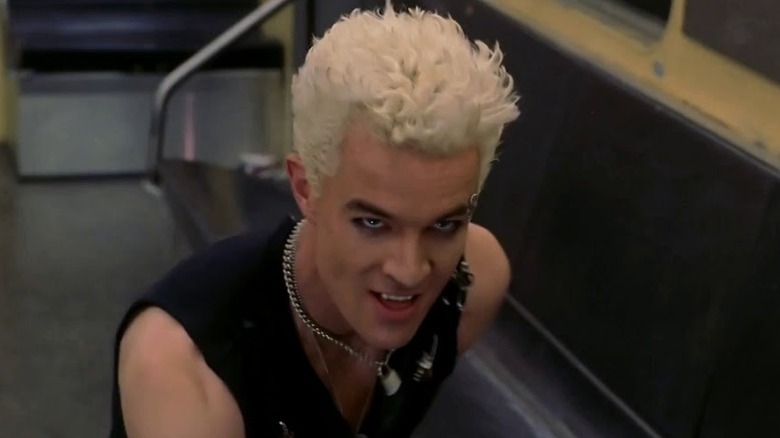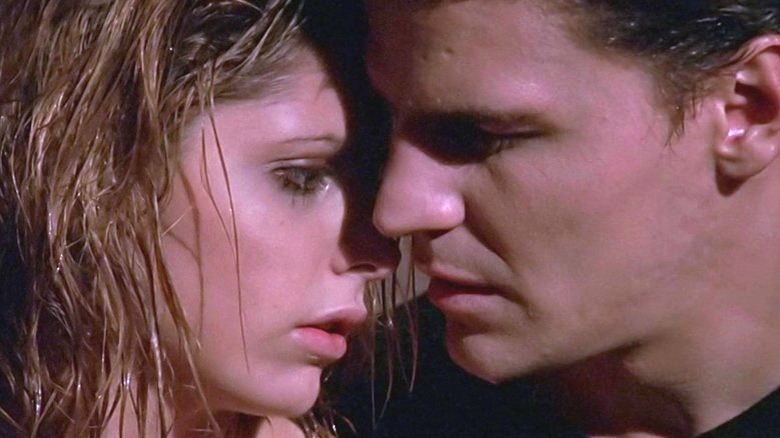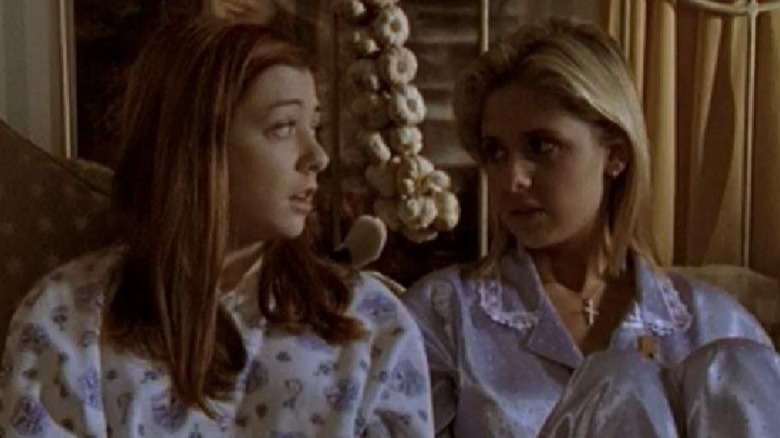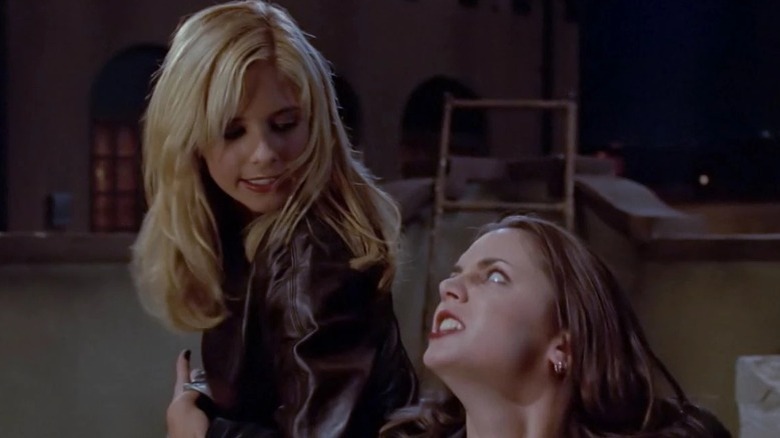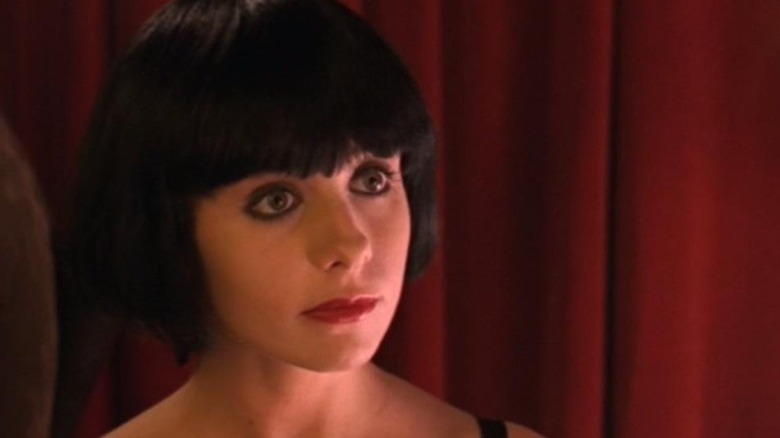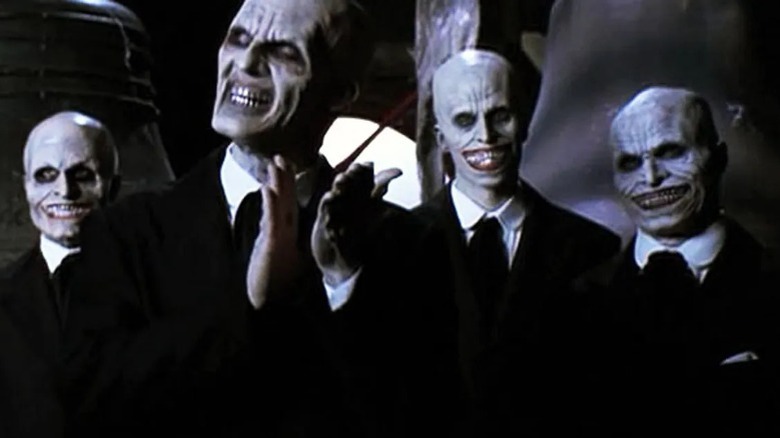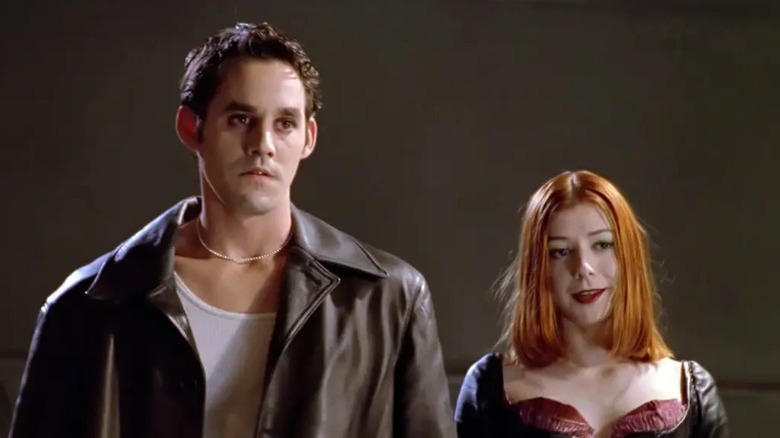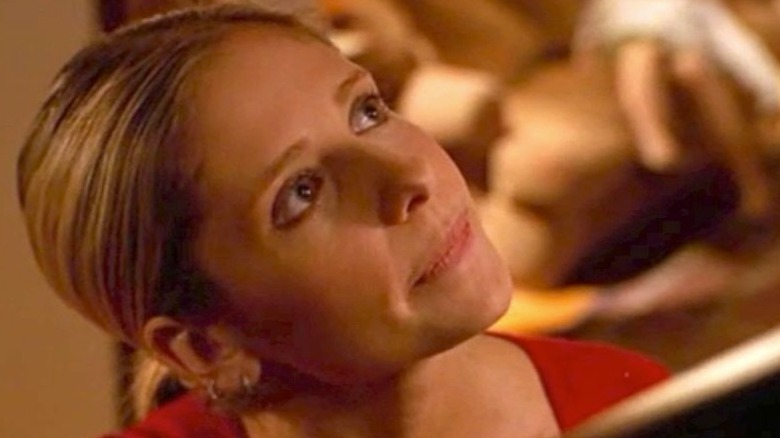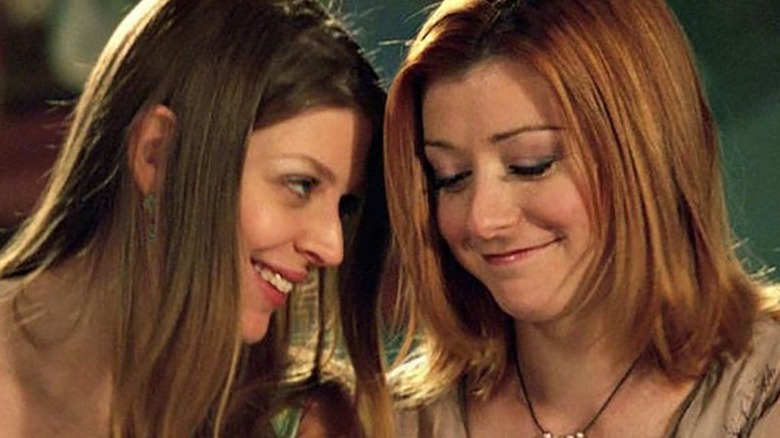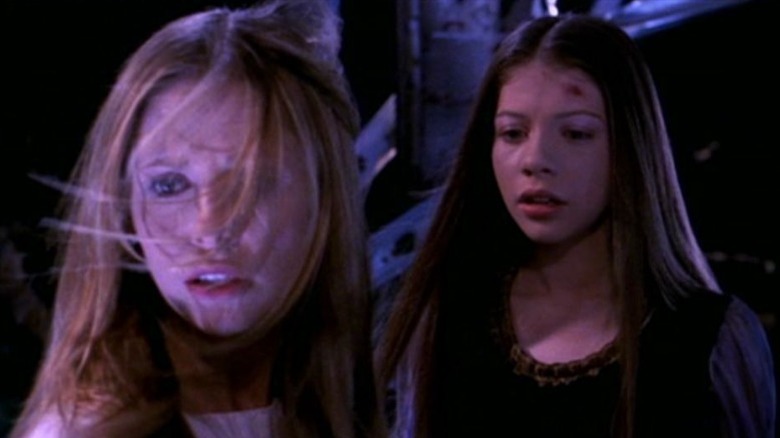The 14 Best Buffy The Vampire Slayer Episodes, Ranked
Before television was populated with supernatural teen dramas like "Riverdale" and "The Vampire Diaries," and long before "Twilight" took the world by storm, fledgling network The WB took a risk on a bold new series called "Buffy the Vampire Slayer." The premise was born out of creator Joss Whedon's idea to flip the perspective on the defenseless blonde cheerleader archetype that typically dies in horror movies by turning her into a hero.
While Whedon is no longer regarded as the feminist hero he once was, the show still has a lot of merit for its originality as both a supernatural horror series and a serious teen drama that deftly handled feminist issues and empowered young women. "Buffy" was a gripping and surprising show to tune into each week. At turns hilarious and terrifying, it's worth revisiting 25 years later. We've gathered the 14 best episodes of "Buffy the Vampire Slayer" from across the series' seven seasons, ranked from worst to best.
14. Prophecy Girl
While the first season of "Buffy" was a bit campier than the rest of the series, it established important thematic elements, namely Buffy's (Sarah Michelle Gellar) struggle with balancing her desire to be a normal teenage girl and her sacred duty to be a Slayer and save the world. This tension comes to a head in "Prophecy Girl" when Buffy learns that a prophecy says the very old, very powerful, and very gross vampire known as the Master (Mark Metcalf) will kill her. While Buffy tries to resist, Giles (Anthony Stewart Head) responds that it's her destiny.
The prophecy comes true when the Master drowns, providing the Scoobies with the first apocalypse and a glimpse of the Hellmouth in the library. However, thanks to Xander (Nicholas Brendon) and Angel (David Boreanaz), Buffy is revived in time to stake the Master and save Sunnydale from destruction. The episode largely brings an end to Buffy's first season arc, as she is forced to embrace her destiny while also foreshadowing her ongoing relationship with death. "Prophecy Girl" also establishes the precedent of Buffy's self-sacrifice in a moody gothic episode that would set the tone for much of the series to come.
13. Chosen
While many "Buffy" fans have mixed feelings about the final season, the series finale is an undeniable accomplishment in terms of storytelling and emotion. As the First Evil hunts down potential Slayers all over the world, Buffy trains the young girls into an army. As a villain, the First Evil is a fluid concept for Buffy to face. However, the First thematically makes sense as a final villain to conquer while allowing for several chilling moments. Because the First can take the corporeal form of any dead person — including Buffy herself — they torment and haunt the Scoobies in a completely new way.
Despite facing a crisis of leadership after the return of Faith (Eliza Dushku), Buffy rallies the troops and develops the best plan to face the First. Entrusting Willow (Alyson Hannigan) to use her magic again after recovering from her deadly addiction, the witch transforms the original Slayer spell so that there no longer has to be "one girl in all the world." It's a powerful and resonant (albeit slightly dated) message of feminine power that lends incredible force to the finale, even amidst the staggering losses. "Chosen" also wisely makes a newly ensouled Spike (James Marsters) the champion who ultimately saves the world, even if Sunnydale doesn't make it.
12. Fool for Love
While he was originally supposed to be killed off after his first appearance, Spike stuck around because of his immense likability, transforming into one of the series' most dynamic characters. "Fool for Love" sees the Slayer seeking out Spike's help after a run-of-the-mill vampire bests her, She wants to know how Spike previously killed two Slayers. Flashing back and forward in time, the episode reveals who Spike was before he was turned: a simpering, lovesick poet.
Spike relishes in teaching Buffy while imparting his twisted philosophical lessons about love, sensuality, and death before he acts on his secret crush and kisses her. However, she doesn't see him the way she saw Angel, rejecting him to the point of tears. The heartbreak spurs Spike to violence, but when he finds Buffy crying about her mom's illness, he chooses to comfort her instead.
The episode provides fascinating and empathetic insight into a character who had primarily functioned as comic relief while exploring what it means to be a vampire and have a soul. Their romance is far from perfect, but "Fool for Love" marks the beginning of the long and complicated journey.
11. Surprise — Innocence
An unofficial two-parter, "Surprise" and "Innocence" see Buffy and Angel face Sunnydale's newest threats, vampire lovers Spike and Drusilla (Juliet Landau), who seek to wreak havoc and chaos on the town by resurrecting and reassembling a murderous and nearly indestructible demon known as the Judge. As Buffy and Angel grow closer, the fear of facing the Judge leads them to have sex for the first time, which leads to unforeseen, disastrous consequences. Angel is cursed with his soul unless he faces one moment of pure happiness — a moment he shares with Buffy.
Neither of them expects him to revert to his demonic Angelus form, but the arc is thematically rich and heartbreaking, mirroring the real experience many girls face after having sex for the first time. While not all teenage boyfriends turn into literal monsters after getting what they want, Buffy is tormented with confusion and guilt over what led to Angel's vampiric relapse. To make matters worse, she has to face Angelus for the first time as she also defeats the Judge. Though the heartbreak is fresh, the Slayer can never rest, and Buffy steps up to the plate. It's a crushing testament to duty in the face of loss and a step forward in her journey as a warrior.
10. Passion
Giles may be Buffy's father figure, but the series makes a point to present him as full of sex appeal. Yet, the Watcher struggles in the romance department until he meets techno-pagan Jenny Calendar (Robia Scott). However, like the rest of the Scoobies, their romance becomes more complicated when Angel loses his soul and Angelus is reawakened. As a descendant of the family who originally cursed Angel, Jenny is determined to help Buffy by restoring Angel's soul.
The clock is ticking as Angelus stalks and torments Buffy and her friends. Angelus kills Willow's fish and watches Buffy sleep. The Scoobies work to take precautions by reversing the spells that welcomed Angel into their homes, but they aren't fast enough. As Jenny finishes working out the restoration spell, Angelus finds her and kills her. Making matters worse, he places her dead body in Giles's bed, leaving a trail of roses for him.
"Passion" is a devastating episode that demonstrates to the Scoobies and fans alike that Angel has truly become the evil Angelus while creating more rifts between Buffy and her friends. Because she prioritizes herself and her love for Angel, Jenny dies and people are hurt. This realization is tragic but necessary in building Buffy into the Slayer that she will become.
9. Graduation Day
The epic two-part Season 3 finale sees the Scoobies graduate high school as they prepare for the Mayor's transformation into a gigantic lizard demon that will destroy Sunnydale. Cementing Faith's alliance with the Mayor, she carries out an order to poison Angel to distract Buffy from the upcoming battle. As the two Slayers face-off, Buffy seeks to deliver Faith to the vampire as a cure. However, Faith jumps off the roof of a building and into a truck, forcing Buffy to feed herself to Angel.
Buffy manages to recover in time for the Mayor's commencement address. In a moving display of solidarity, the students band together with the Scoobies as a de facto army. While plenty of students die, it's one of the only times that Sunnydale helps Buffy, giving her enough time to lead the Mayor into the explosive-laden library where she taunts him with his one weakness — his love for Faith.
The thematic heart of these episodes can best be summed up in the final moments when Oz (Seth Green) has the Scoobies reflect on their survival, not of the battle but of high school. In a world where young people are rarely taken seriously, "Graduation Day" exemplifies the magic of "Buffy" at its best by showcasing the strength and power of adolescence.
8. Becoming
The heartbreaking two-part Season 3 finale sees Buffy face down Angelus as he raises the demon Acathla to bring Hell on Earth. While Giles and the Scoobies research to discover Angelus's plan and how to stop him, Buffy is ready to close the chapter on Angel. Kendra (Bianca Lawson), the Slayer who rose after Buffy briefly died, returns to Sunnydale with a warning about the looming apocalypse and agrees to help Buffy.
Unfortunately, Buffy is lured into a trap to meet with Angelus, leaving the rest of the Scoobies and Kendra alone in the library where Drusilla kills the Slayer, kidnaps Giles, and puts Willow into a coma. Buffy returns to the library just in time to be caught by the police as they arrive on the scene and assume she's responsible for the crime.
When Willow wakes up, she performs the complicated ritual to restore Angel's soul while he and Buffy face off, but it's too late. Acathla has been awakened, and Buffy has to let go of Angel. As a fugitive on the run, even from her mother who refuses to understand her, Buffy leaves Sunnydale behind, spurred by guilt and doubt. Anchored by flashbacks to key moments in Angelus's past, the two-parter lives up to its title, with Willow coming into her power as a witch and Buffy facing up to the sacrifices she has to make as a Slayer.
7. Restless
While the previous episode sees Buffy and the Scoobies defeat the Initiative, the atypical Season 4 finale follows the aftermath as the gang watches a movie before passing out. A mix of weird dream logic, nightmarish high school anxieties, and mystical foreshadowing, "Restless" dives into their dreams one by one. Across all of their dreams, they are pursued by the First Slayer, whose powers they channeled and awakened.
The First Slayer kills Buffy's friends in their sleep, attacking Giles's brain, Xander's heart, and sucking Willow's life force. When Buffy faces her, the First Slayer tells her the Slayer is not supposed to have friends. This notion snaps Buffy out of her dream state as they fight. Buffy defeats her and wakes them all up from their dreams. While they go about the rest of the night enjoying their movie, the episode and season end with a final message from the First Slayer that sets up the big reveal of the Season 5 premiere: the introduction of Buffy's sister.
Thanks to the very real weirdness of dreams, "Restless" allows for several genre departures like an "Apocalypse Now" homage and a musical performance from Giles. The episode also signals the thematic exploration of Buffy's connection to her Slayer lineage and power that unfolds over the next season.
6. Hush
One of the scariest standalone episodes, "Hush" is a dark fairytale that revolves around the Gentleman. The Gentlemen are a silent group of demons who arrive in Sunnydale and capture the voices of the town so they can steal hearts to complete a ritual without anyone hearing the screams of their victims. The episode is a delightful departure in form, with minimal spoken dialogue, guided mostly by nonverbal gestures, music, and increasing panic as the Scoobies try to solve the mystery. The Gentlemen (led by the great horror fantasy character actor Doug Jones) are a genuinely creepy group of suited, smiling, polite demons who soundlessly float through the sleepy town with scalpels to perform forced open heart surgery.
Backed by Christophe Beck's lush score, "Hush" is incredibly suspenseful and unsettling. The episode also manages to advance crucial plot points. "Hush" introduces Tara (Amber Benson) and as a result, Willow's gay identity. It also reveals Riley's (Marc Blucas) membership in Sunnydale's paramilitary demon-hunting organization The Initiative to Buffy. While the fourth season is regarded as one of the weakest, "Hush" is the only episode of "Buffy" that garnered Whedon an Emmy nomination for writing, proving the profound creativity of the series even as it struggled to find its footing.
5. The Prom
After Buffy's mother, Joyce (Kristine Sutherland), tells Angel that he and Buffy have no future, Angel unceremoniously dumps her right before senior prom. Though Buffy and Angel's romance is doomed for multiple reasons, the Slayer finally faces the reality of their relationship after their breakup and what her future might look like without him. Yet, when someone decides to release a pack of hellhounds on the school, a heartbroken Buffy is determined to make sure her friends can still have the prom night of their dreams. Buffy singlehandedly takes them down, channeling her grief into destroying the beasts.
The Slayer ends up going to the prom alone and finds that though the night wasn't what she had envisioned, it's full of surprises. Sunnydale's Hellmouth is an open secret, but the town doesn't acknowledge the dangers or its heroes. In one of the most heartwarming moments of the high school seasons, Buffy's classmates present her with the Class Protector Award, a show of solidarity and support for all the times she'd saved their lives through the years. She may not have been crowned prom queen, but the award makes "The Prom" all the more meaningful, especially when Angel shows up for one last dance. "The Prom" exemplifies the mix of fantasy and reality that grounds teenage human emotion in a poignant and heartfelt episode.
4. The Wish
Anya (Emma Caulfield Ford) has a long arc in which she learns what it means to be human. However, she is introduced as a vengeance demon who exclusively serves scorned women. This leads her to a heartbroken Cordelia Chase (Charisma Carpenter), who decides that all of her problems stem from Buffy'. This wish is enough to spin Sunnydale into an alternate universe without a Slayer. This version of Sunnydale is overrun with vampires, bound by sundown curfews, and policed by a vigilante group led by Giles and Oz. In a spooky twist, Willow and Xander have been turned and are serving the Master, who Buffy never killed.
Cordelia is thrilled and then terrified by the world she's manifested. She warns Giles to find Buffy. When Buffy arrives, she's a battle-hardened soldier with little warmth for those around her. The episode makes it clear her isolation has made her a lesser Slayer, as she is soon defeated by the Master. As he gains power and more people die, Giles breaks the spell and shatters the alternate reality — all based on the hope that there has to be a better world. "The Wish" is a fun and creative departure that showcases Buffy's value as well as the power of believing in something more. It also demonstrates the bonds between the characters that last beyond the immediate dimension they inhabit.
3. The Body
While "Buffy the Vampire Slayer" is a show about a girl battling all things supernatural, it's also about her struggles with the mundane human parts of life. This includes coping with the tragic loss of her mother, Joyce, who seemingly recovered from her brain tumor only to die suddenly at home. After a harrowing stint in the hospital, Joyce bounced back and even started to date, making Buffy's discovery of her body all the more shocking.
"The Body" makes deliberate choices to portray the surreal aftermath and shock of the loss. There is no music in the episode, which employs slow, deliberate pacing and provides brief flashbacks to incorporate Buffy's denial. The Scoobies come together for Buffy and her sister, Dawn (Michelle Trachtenberg), but they also each get their moment to grieve Joyce, with Anya's monologue becoming one of the standout moments in the series. Though Buffy began by interweaving the human and supernatural as a way to understand the teenage experience, "The Body" is stark for focusing solely on Buffy's life as a human being with only a minor departure into Slaying. Inspired by Joss Whedon's own loss of his mother, the episode is one of the most moving portraits of grief in television history.
2. Once More, with Feeling
Thanks to the format of the series, "Buffy" has several genre homages, but its musical episode was groundbreaking. Thanks to a music-loving demon named Sweet (Hinton Battle), Sunnydale residents are singing and dancing themselves to death — literally. While the rest of the Scoobies are desperate to find a way to stop the musical madness, Buffy's depression after coming back from the grave creates a dangerous apathy, drawing her to the fantastical departures from reality the spell creates. In a heartbreaking song, she finally confesses she was in heaven, not hell, and nearly dances herself to death until Spike saves her, reminding her that pain is part of living.
The episode also advances important plot points like Willow's increasing addiction to magic and Giles's realization that Buffy is too dependent on him, leading to a gorgeous and crushing duet between Anthony Head and Amber Benson. While many other series have attempted musical episodes, few have the quality, originality, or emotional depth of "Once More, with Feeling." Filmed like a golden age Hollywood musical complete with a rousing score, cinematography, production design, and choreography, the episode is full of memorable original songs that serve the characters and plot. "Once More, with Feeling" was not just a triumph of storytelling and emotion but a truly cinematic television experience.
1. The Gift
The Season 5 finale was originally written as a potential series finale with The WB having canceled the series. As a result, the episode presents the pinnacle of Buffy's leadership as she faces the ultimate apocalypse and ethical questions of what it means to be a Slayer. With the god Glory (Clare Kramer) holding her little sister captive for her blood to open an other-worldly dimension, Buffy is determined to save Dawn. Giles stresses they have to prioritize the greater good, not just Dawn's life. Her belief in finding another way is core to her humanity and out-of-the-box thinking as a fighter. Yet, it also leads to one of the most shocking and powerful moments in the series with a tour-de-force performance from Gellar that garnered her only major acting acclaim for the role with a Golden Globe nomination.
While the Master drowns Buffy in "Prophecy Girl," Buffy willingly sacrifices herself, using her blood in place of Dawn's to close the dimension and save the world. This ultimate selfless act underscores who Buffy is. Her death could have been the final image of the series. Instead, it sets up thematic explorations of grief, death, and depression. Furthermore, Buffy's final words to Dawn, "The hardest thing in this world is to live in it," have had a poignant lasting power for more than 20 years, exemplifying the Slayer's true strength.



